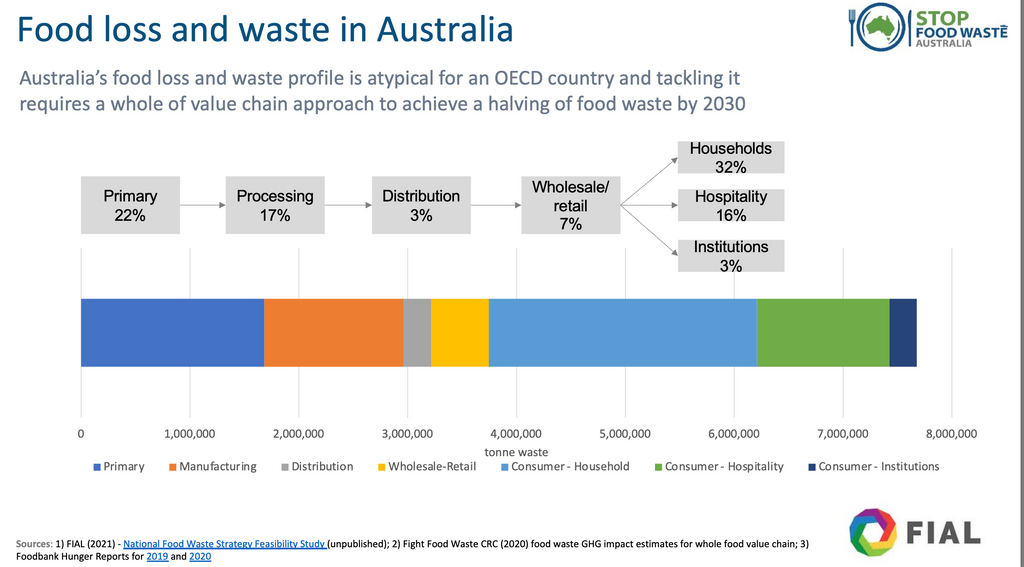Some of the team recently attended a Food Agribusiness Network event where we heard from Mark Barthel of Stop Food Waste Australia. Mark shared his insights on fighting food waste. It is a topic close to our hearts and ripe with innovation opportunities. There are some great podcasts that are leading the way in this space too. IDEO’s Food by Design and The World Food System have also inspired us to dig deeper into the ways in which we can create better food systems that reduce waste and feed the world well.
Globally 2.37 billion people are without food or unable to eat a healthy balanced diet on a regular basis (2020).[1] 1.2 million children are living in food insecure households globally and in Australia one in six people struggle to afford enough to eat.[2] In the context of food waste this provides a sobering challenge, but there is also immense opportunity. If you look at the value chain in Australia alone, the cost of food waste to the Australian economy is $36.6 billion a year.[3] Our food systems are crying out for revolutionary and systemic innovation. Imagine a future where food is never wasted.
The United Nations has set a Sustainable Development Goal (UNSDG 2) to end hunger, achieve food security and improved nutrition and promote sustainable agriculture by 2030. Innovative solutions to reducing food loss and waste will go a long way to reaching this goal. They will save money for farmers; food companies and households and they will help to feed more people and will alleviate pressure on land and climate. Creative thinkers who can provide answers to these very real problems by the fast-approaching deadline will most surely have the competitive advantage.
Where to start?
The overwhelming nature of the food waste challenge requires a systemic analysis of the losses occurring in our value chain. Throughout every stage food is squandered, starting in the paddock, and continuing through to handling and storage, processing and packaging, distribution to market and consumption in households, hospitality, or institutions. Every juncture presents fresh opportunities to innovate and create impact.

Finding solutions
Food waste is an opportunity with real economic value if you flip the way you think about it. The move towards food upcycling has seen some brilliant innovations. Take Grain4Grain for example, a company that dries and mills brewers spent grain into a low carb, high protein flour. Rubies in the Rubble makes condiments by using ingredients that would otherwise be left to rot in the paddock. I am Grounded is a business that upcycles the fruit of coffee into functional plant-based energy snacks. Usually, this part of the plant is left to rot on the farm ultimately contaminating waterways.
Our food systems need to change. At every stage of the value chain there is opportunity if you look, and solutions will need to balance the tensions between waste, packaging and health and nutritional requirements.
In the words of one of the world’s most famous innovators, Henry Ford -
“If you always do what you always did, you'll always get what you always got." If we want to change we need to think and act differently.
There’s nothing the Sustainable Innovation Co loves more than a challenge like this. The idea of making business more sustainable, profitable, and meaningful is what gets us out of bed every day. If you are interested in being a part of the solution to feed the world well, and without waste please keep in touch with us. Imagine a world where people didn’t go hungry.
[1] https://unstats.un.org/sdgs/report/2021/
[2] https://reports.foodbank.org.au
[3] https://www.fial.com.au/sharing-knowledge/food-waste


